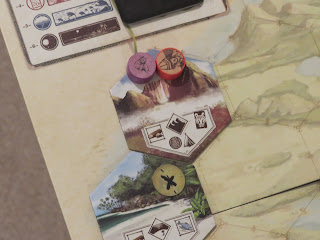While I've been recovering, my brother-in-law has kindly lent me his copy of Robinson Crusoe - Adventures on the Cursed Island.
This is a solo / co-op game of being cast away on an uncharted island.
I played the first scenario "Castaway" and randomly picked the ship's cook as my character.
The core of this game is a limited time (12 days) to build a huge signal fire and attract a ship to rescue me. Each day my character can take two actions (placing my two action tokens, rather like Agricola).
In a solo game I have help from Friday (1 action token) and a dog (1 action, but only to Explore the island or Hunt).
To complete the scenario I will have to Explore and find a mountain (a pre-req to make fire) and Gather 17 units of wood, then Build my shelter and the woodpile. There's a lot to do and probably not enough time.
For each action I can use one of my tokens and then roll the dice to find out whether I succeed or fail, maybe taking a wound in the process, or I can use two tokens to succeed automatically. This mechanic neatly emphasizes the feeling of too much to do with not enough time to do it properly. No doubt there will be a need to take some risks and rush a few of the tasks.
Learning this game from the rulebook has been a major challenge.
There is a numbered list of 17 steps to setup a game and a picture of an example game with each element of the setup numbered to show which step put it there. It should have been so easy. Sadly there were several mistakes and unclear instructions, so it took me a week to reach the point of starting play. The setup instructions are for a 4-player game, with a later section to explain the differences in a 2-player game. A further section describes the solo game as just like the 2-player game with some differences. Back and forth through the rulebook, I got there eventually.
This game has not skimped on the physical parts and the production value is impressive. There is a space on the board for the action to Arrange the Camp, printed with a reminder of the results, and there is even a card to cover it up with the different results in a 4-player game, but not one for a solo game.
The cost in resources (wood & furs) to build a shelter varies with the number of players, but the table printed on the board starts with 2 players and only the rulebook notes in the solo section that solo costs are the same as for 2 players.
Once the cook has a fire, I can add a fireplace and then the evening meal will heal a wound. I'm going to prioritise fire over building a shelter and accept some wounds overnight from sleeping rough on the beach.
I explored the next hex from my camp, taking the dog and got lucky.
 |
| what my exploration found |
It's a mountain (presumably containing flints, since that lets me make fires and knives). It also contains a natural shelter (saving me 2 wood and an action spent building).
I spent the rest of the day gathering wood and food in the new mountain with help from Friday.
So far I've found 2 hexes that produce wood, and I can only get 1 unit of wood per day from each of them. 15 wood in 12 days is looking impossible unless I can explore some more, and I still need spare actions to make fire and build the woodpile... I'm starting to see what this game is about.
Tomorrow's priorities will have to be making fire and a fireplace, then move camp to the natural shelter tomorrow night...
Update: the game slowed down as the weather took a turn for the worse, requiring me to spend time on building a roof for the shelter and causing wounds in the meantime, which then had to be healed. My exploration found 1 more hex, which yielded an antique rapier, the only weapon I needed
A series of event cards needed actions to be spent to deal with problems. However, by day 7 I had the hatchet, which meant 2 units of wood per day without needing to spend any actions collecting it (on top of my existing stocpile from days of gathering)and I realised that the woodpile does not have to be built (with a build action for each stage) and instead builds itself so that victory became assured.
I had constant need to refer to the 61 pages of official errata and FAQ, which made this first game slow and frustrating, but there are plenty of other scenarios and different characters to use, so there should be new interest in each new playing. Maybe I was unfairly lucky to win this one first time.
Until next time, health & happiness to you all.
